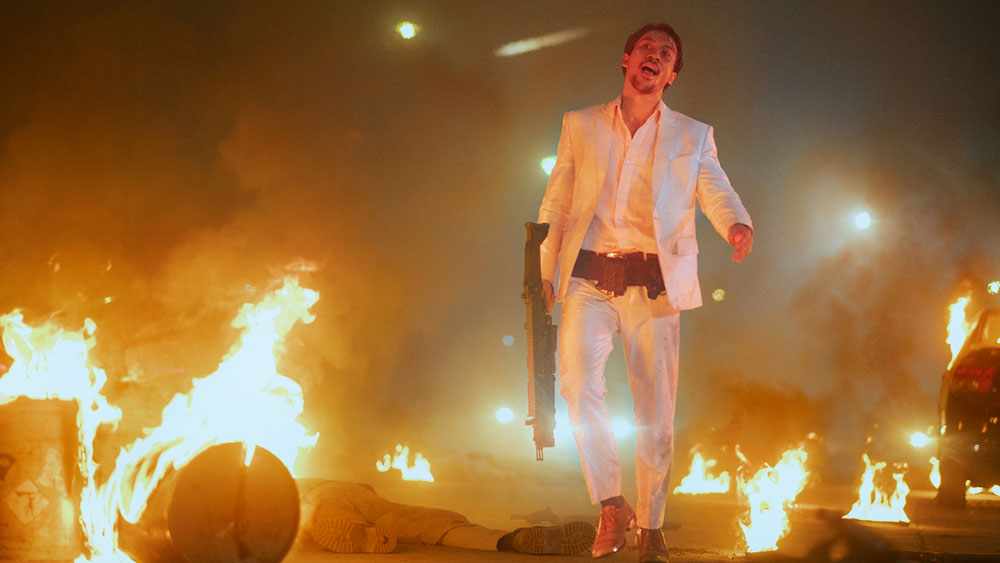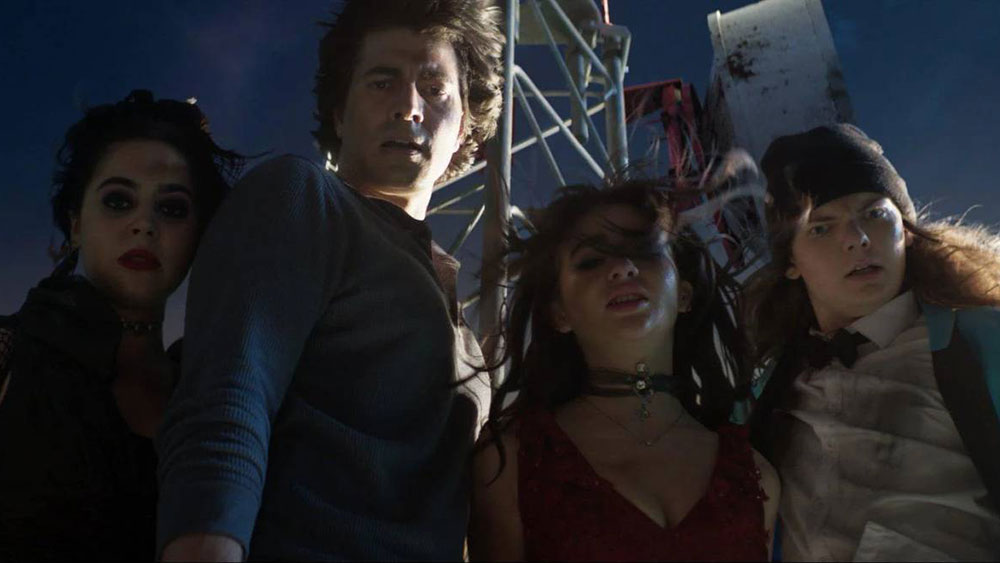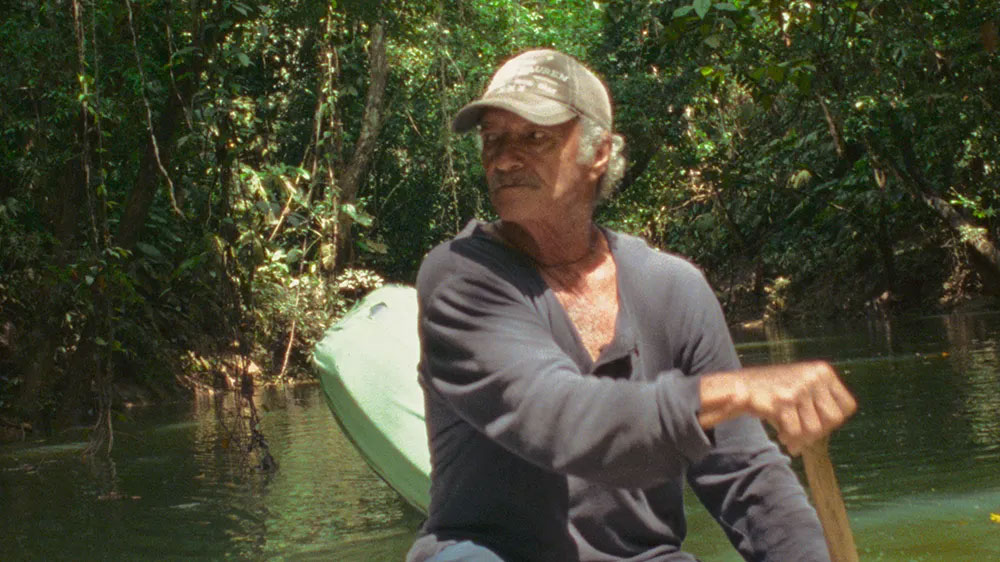Our dispatch on the 2024 Toronto International Film Festival comes courtesy of David Schwartz, Elissa Suh, and Saffron Maeve, who offer their impressions of this year’s surprising discoveries, unexpected encounters at Midnight Madness, and adventurous programming in the Wavelengths section.
David Schwartz
Before hitting its stride in the 1990s as North America’s largest and most important film festival, the Toronto International Film Festival was the “Festival of Festivals,” a name which acknowledged that its lineup drew heavily from the premiere European festivals, including Berlin, Cannes, and Locarno. That’s still the case. My first day at this year’s TIFF started with Mati Diop’s poetic documentary Dahomey (2024, Grand Prize winner at Berlin), Mohammad Rasoulof’s heart-pounding drama The Seed of the Sacred Fig (2024, Special Jury Award winner at Cannes), and Hong Sang-soo’s latest gem By the Stream (Best Performance winner for Kim Min-hee at Locarno).
With many of its treasures shared across other festivals, where does TIFF find its distinct personality? Certainly not in the stultifying blandness of its neighborhood: Toronto’s sterile Entertainment District, which makes New York’s Hudson Yards feel charming. With nearly 300 films, and without the clarifying focus of, say, the Cannes Main Competition, TIFF is a choose-your-own-adventure affair. Thanks to such adventurous sections as Wavelengths, led by programmer Andréa Picard, and Discovery, led by Dorota Lech—and with plenty of world premieres and other fresh finds scattered throughout the overall lineup—this year’s edition was invigorating, with accomplished work by new talent.
The Discovery section opened glamorously with Bonjour, Tristesse (2024, pictured at top), an auspicious filmmaking debut by Durga Chew-Bose, the Montreal writer best known for her collection Too Much and Not the Mood. Her vivid personal essays are marked by a quality that the author Kate Bolick described in The New York Times as “visual-verbal” synesthesia. With Bonjour, Tristesse, Chew-Bose proves herself a strong visual stylist and an even stronger dramaturg, plumbing depths and finding rich psychological complexity in the famous first-person novel written by an 18-year-old Francoise Sagan, in 1954. Just four years later, it was adapted by Otto Preminger into the cool, crisp CinemaScope production that launched Jean Seberg to stardom.
Set in the French Riviera, Bonjour, Tristesse concerns interlocking love triangles among a group of attractive and aimless aristocrats. At the story’s core is the extremely codependent relationship between a father, Raymond (Claes Bang), and his impetuous daughter, Cécile (Lily McInerny). The two are soulmates in their perpetual search for pleasure and their disdain for adult responsibility. But their playful mood is tempered by the arrival of Raymond’s old friend Anne, a sophisticated designer whose cool maturity is captured with razor-sharp intelligence by Chloë Sevigny. Anne’s need for control, and her unrequited love for Raymond, have taken a toll on her.While the novel takes Cecile’s viewpoint, Chew-Bose expands the emotional canvas, adding depth to all of the characters; each is as flawed as they are sympathetic. Chew-Bose revels in the sensuality of the setting, and the physical beauty of all of the characters, while also remaining true to the underlying tragedy—the tristesse—of the tale. The South African-born actress Embeth Davidtz makes an almost equally impressive directorial debut with Don’t Lets Go to the Dogs Tonight (2024). Here, she adapts a child’s-eye memoir of growing up amid family turmoil and civil war in late 1970s Rhodesia, just before the country earned its independence from white, British rule and became Zimbabwe. Teeming with life in every frame, this is a richly textured film in which a family’s conflicts are organically interwoven with the racial and political conflicts unfolding around them. The movie is carried by an extraordinary performance—one of the festival’s best—by Lexi Venter, a seven-year-old making her acting debut.

Brilliantly examining the effects of toxic masculinity are two under-the-radar films that had their world premieres at TIFF: the Turkish director Belkis Bayrak’s feature debut Gülizar (2024) and the Romanian couple Lina Vdovîi and Radu Ciorniciuc’s documentary Tata (2024). In Gülizar, the 22-year-old title character, who lives under the oppressive and judgemental thumb of her parents, is looking forward to her marriage to a man in Kosovo, largely to leave her homeland and find personal freedom. On a lone trip to Kosovo, she is sexually assaulted at a bus stop. The event traumatizes her and the dismissive response she receives from both authorities and her own family reveals the pervasiveness of abuse in her life. With understated control, the actress Ecem Uzun captures Gülizar’s turmoil and transformation. With few options, and little support, her drama is mainly internal, captured eloquently by Bayrak’s precise, atmospheric direction.
Tata is a spontaneous first-person documentary. Vdovîi was scarred by verbal and physical abuse from her father as a child; in turn, this largely inspired her to become a documentary filmmaker. That way she could explore stories of abuse across society. One day, when she gets a video message from her father showing bruises on his arm and asking her to help, she reluctantly travels with her partner to meet him. This resulting multilayered film plays as both a long overdue confrontation with her father, and an intervention, as she arms him with a hidden camera so that he can document the abuse he is receiving from his boss. We come to learn that the family grew up in impoverished Moldova and that the father works at a factory in Italy, where he is demeaned as an immigrant and physically abused by his volatile boss. He becomes the victim of the treatment he gave his own daughters. Vdovîi and Ciorniciuc’s use of home movies and first-person narration, in addition to their decision to set up a startling confrontation between father and daughter, makes Tata a deeply moving film that captures a brave attempt to break family patterns.
My two most joyous discoveries at the festival arrived in Toronto shortly after their Venice premieres. Maura Delpero’s exquisite Vermiglio (2024) is a family drama set in a remote Italian mountain village during World War II that’s changed by the arrival of a mysterious and attractive soldier. In a style reminiscent of Ermmano Olmi, Delpero works patiently, capturing the physical beauty of the village and the quiet but intense drama of the villagers’ lives. A stern but sensitive father is the local patriarch; he is both the father of seven children and also the schoolteacher. The film sees the father’s eldest daughter fall in love with the visitor. Delpero displays a novelistic attention to the inner lives of her characters. On top of that, Vermiglio is also a beautiful film, shot with crystalline precision by the Russian-born cinematographer Mikhail Krichman, best known for shooting Andrey Zvyagintsev’s films. Vermiglio took the Silver Lion at Venice and was picked up for U.S. distribution by Sideshow, so the film will have a life here. I hope that the Argentine director Luis Ortega’s magical Kill the Jockey (2024) also finds its way here. Filmed by Timo Salminen, Aki Kaurismäki’s frequent cinematographer—he shot last year’s Fallen Leaves—Kill the Jockey is a deadpan delight about a jockey named Remo and his girlfriend Abril (also a jockey). Remo is struggling with addiction, and soon gets into deep trouble with the criminal underworld that controls his career. Kill the Jockey is directed as though it were a lean genre film, but it is also loosely surreal, at times bursting into moments that could be from a musical, and featuring a number of physical transformations, including a gender reversal by the main character, and a rebirth, that remain unexplained. The less known about this surprising film the better, let’s just hope it finds its way to New York.
Elissa Suh
At TIFF, Midnight Madness is a small but tightly curated slate. This year it houses The Substance (2024)—Coralie Fargeat’s body horror film starring Demi Moore—as well as international genre fare, like Timo Tjahjanto’s The Shadow Strays (2024), and other gems.
Shadow Strays finds the Indonesian director serving up a bombastic supply of gore and ruthless parade of decapitations The title refers to an order of clandestine assassins, one of whom (Aurora Ribero) puts her life, and the group’s reputation, on the line when she tries to save an newly orphaned boy who lives in her building. While technically impressive, the showboating action is keenly diminished by the lack of levity and emotional motivation, more so than even the most set-piece oriented action flicks.

Working in a similar mode of extremes to much better effect is Joseph Kahn (Bodied, 2017), whose latest feature Ick (2024) does for the early 2000s what Detention (2019) did for the 1990s. Under the guise of a creature like The Blob, the music video auteur uses the genre template to confront political apathy with his usual hyperkinetic verve. In the film, The Ick—a sludgy vine-like entity—has been incrementally spreading through the small suburban town of Eastbrook, first as an innocuous outgrowth and then as a violent, murderous, and possessive one. No one seems to notice—or care—except the local highschool science teacher Hank (Brandon Routh in full Bruce Campbell mode) and his student Grace. After suffering a career-ending knee injury, the former high school teacher dwells on his glory days and fantasizes about getting back together with his sweetheart (the always welcome Mena Suvari), Grace’s mother, hoping to sway his maybe-daughter from the same dead-end, small-town fate.
Ick is painted with a ricocheting maximalism—a litany of fast-paced cuts, needle-drops, and whiplashing one-liners targeting everything from Creed to anti-vaxxers, the deep state to Bela Tarr and J.K. Rowling. The expert level of chaos that pervades the film may risk obscuring its themes or distracting from Kahn’s ultra-sardonic sensibility. However, it is precisely this surfeit of style—the hysterical melding of political and pop sensibility—that charges the movie with breathtaking originality.
Deadmail (2024) possesses a languor typically unforeseen in midnight movies. When an Illinois post office receives a bloodied "help me" note that gets sorted as undeliverable mail—known as “dead letters”—one clerk, Jasper (Tomas Boykin), attempts to solve the mystery. The non-linear narrative eventually wends its way to reveal that a synth engineer is being held captive in the basement of an admiring and lonely patron who keeps an overly watchful eye on him. Joe DeBoer and Kyle McConaghy's tactile, lo-fi thriller weaves disarming melancholy into this Misery-framework, infusing unwarranted empathy into the lives of loners making use of it stale air of basements and corridors of a desperate few lives in a 1980s Midwestern suburb.

Before the audiophile-benefactor’s obsession tipped into cruelty, their relationship was genuinely touching and marked by a deep connection over the art of synths. Horror lurks in the mundane, but so does humanity. Rather than exaggerating the characters—let’s call them nerds—into something pitiable, the directors choose to portray them with unexpected empathy. Jasper leads a quiet life of solitude at an affordable dormitory for men. His amateur sleuthing and painting of miniature figurine paintings fuel his time. Similarly, Josh finds solace in his work, pinning down the sound of elusive woodwinds. Shedding light on their loneliness, the film honors these quiet obsessives and their bygone hobbies.
Typically the Midnight section has become the festival stop for overt comedies, and Andrew DeYoung’s Friendship (2024) was an oasis of laughs. Starring Tim Robinson, it feels both like an extended sketch from the comedian's show I Think You Should Leave (2019 - ) and a series of them, taking place around corporate meetings and domesticated suburban family life alike. DeYoung makes Robinson's signature brand of humor palatable for a broader audience without sacrificing the weirdness or losing loyal fans.
Robinson’s aggressively earnest manchild vulnerability is funneled into the character of Craig Waterman, a seemingly normal man with a wife (Kate Mara, deadpan foil), teenage son, and steady job (digital marketing exec) whose life is forever changed upon meeting his new neighbor Austin (Paul Rudd). He is the local weatherman—an approachable neo-Brian Fantana with his own catchphrase and a rock band; in short, the type of dude who lends a laid-back cool to everything he touches, from his interest in antiquities and questionably superior knowledge of the sewer system. When their friendship is abruptly cut short after Craig commits a series of social faux pas, he does all he can to get back into Austin’s bromantic graces. Harmonized by Keegan Dewitt’s minimal score, the film riffs on the sketch show’s obsession with social norms leads to exhilarating awkward cavalcade of non sequitur gags—the brilliant randomness of which won’t make much sense to explicate here—when these unwritten rules are broken. Addressing stagnant environments and societal norms, both Ick and Friendship, with their uniquely berserk tactics, prompt us to reconsider the status quo.
Saffron Maeve
The experimental arm of TIFF’s programming, which borrows its name from Michael Snow’s landmark film Wavelength (1967), programs “daring, visionary, autonomous voices that expand our notion of the moving image.” Each year, the selections range from short film programs to hefty features (in this iteration, Dimitris Athiridis’s 14-hour contemporary art-doc exergue - on documenta 14 embodies the latter). In my experience, Wavelengths curators Andréa Picard and Jesse Cumming have been attuned to organic matter, interspecies mediation, and post-natural thought—themes exemplified by two of the 2024 feature picks, Nelson Carlo de los Santos Arias’s Pepe, an audacious act of ethnography from the perspective of the ghost of Pablo Escobar’s prized hippo, and Wavelengths alumna Jessica Sarah Rinland’s Collective Monologue, which affectionately observes a caretaker at the controversial Buenos Aires Eco-Park. Both films use a mixture of 16mm and surveillance camera footage, which inspires age-old questions of supervision and captivity, and whether the camera is an institutional device or a mode of liberation.

The first thing I caught at the festival was a Wavelengths pick: Truong Minh Quy’s Viet and Nam (2024), a remarkable romantic drama about two coal miners whose relationship is strained by Nam’s (Pham Thanh Hài) intention to move abroad for better work. Their final stretch of time together comprises a search for Nam’s father, a buried martyr who never returned from war in the 1970s. Full of chiaroscuro compositions—flesh against endless coal, a single light animating the image—Viet and Nam is deeply sensorially engaged. The two miners, whose eyes are weakening from the constant darkness and whose earwax is ink-black, exchange bodily matter (to the horror of some audience members, it seems), fastening their identities to one another while anticipating their grueling split. Unsurprisingly, the film is banned in Vietnam; the Vietnamese Cinema Department cited its “gloomy, deadlocked, and negative view” of the country as the cause—an instance of bowdlerizing that only underscores Quy’s themes of confinement and a precarious national character.
The buzziest Wavelengths events are the shorts programs, of which I only managed to attend two out of the three—these coveted seats are in an unfortunately small screening room. Wavelengths 1, titled “Eye & Ear Control,” featured the Jordanian artist and “private ear” Lawrence Abu Hamdan’s 45-minute film essay The Diary of a Sky (2024), which incorporates publicly sourced cell phone footage of Israel’s sonic terrorism effectuated in the skies of Beirut. Abu Hamdan’s contentions against the militarization of airspace—cataloging the peaking noise levels and ugly suite of cowing fighter jets—are poignantly balanced by instances of silence as rerouted violence. The rare occasion when Beirut’s skies are hushed implies that another airspace is presently occupied and targeted; as the film explicitizes, the silences signify the ongoing genocide in Gaza.

Wavelengths 3, “Exposé(s),” featured a superb bit of curation, pairing Jean-Luc Godard and the English avant-gardist John Smith. Scénarios (2024) is Godard’s last film, finalized the day before his assisted death, a staggering loss inscribed onto every frame. Arranged in two parts—DNA, fundamental elements, and MRI, Odyssey—the film essayistically collates past footage, notes, and images to mount an inquiry of art, cinema, language, and iconography. Directly afterward played Exposé du film annonce du film “Scénario” (2024), in which Godard explores his scrapbook-cum-storyboard with frequent collaborator Fabrice Aragno in 2021, detailing the six-chapter feature he wishes Scénarios to become.
After an hour of piqued feeling came the world premiere of Smith’s wry, prodigious documentary of the self Being John Smith (2024), ostensibly about the ubiquity of his name and the other men who have lived in its genericness. The film begins with light family history and crude nicknames tossed around on the playground before devolving into a confessional on cancer, deterioration, and our expiring world, all the while remaining ferociously funny and tethered to pop culture anecdotes about Paul McCartney and Pulp’s Jarvis Cocker. Smith uses a kind of multimodal messaging, where he expresses a banal sentiment about his name in voiceover while mismatched black intertitles convey his anxieties about the quality of his art and the new curvature of his voice after cancer treatment, at one point condemning the genocide against the Palestinian people and calling for a ceasefire.
The sweeping honesty and playfulness of Being John Smith animated the room, but Smith’s insecurities—which come off as charming self-awareness in the film, though he would likely disagree—remained largely intact afterward. When I asked about his experience watching the film for the first time in a theater alongside Godard, Smith laughed and replied that Godard’s films felt “too cryptic” while his own felt “too obvious,” suggesting there might be a healthy middle somewhere between the two. (I suspect we, the audience, were that middle, ping-ponging between gloom and elation.)
Features-wise, there was the Mexican-Canadian director Nicolás Pereda’s Lázaro at Night, which renews the director’s collaborations with Lagartijas Tiradas al Sol, a multidisciplinary theater company founded in 2003 by Luisa Parado and Gabino Rodriguez. Parado and Rodriguez star as two thirds of a desultory love triangle with Francisco Barreiro—setting up a deadpan, Mexico City-set scenario that fiddles with intimacy and performance with its prickly trio of aspiring thespians. As with his earlier work, Pereda configures his working-class subjects with keen realism that’s offset by bouts of mysticism. In an elongated gag roused by César Aira’s magical surrealism, the film mutates into a sick fairytale—the sort of punishment you might expect for a troupe of forty-something method actors.
Analogously committed to surrealist thought, though tonally unalike, the visual artist and filmmaker Madeleine Hunt-Ehrlich’s The Ballad of Suzanne Césaire (2024) is an essayistic respinning of the life and work of anti-colonial theorist Suzanne Césaire, whose contributions to Afro-surrealism and the Négritude movement were revolutionary. The film is based in part on Terese Svoboda’s essay “Surrealist Refugees in the Tropics,” and the Martinican cultural magazine Tropique, which was founded by Suzanne, her husband the poet-politician Aimé Césaire, and René Ménil, while blockaded in Martinique during WWII. Moving between times, languages, and political realities, with deep attention to the construction of the film object, The Ballad of Suzanne Césaire beautifully negotiates Césaire’s gaze through contemporary ruminations on art.
A group of actors inhabit the roles of Suzanne (Zita Hanrot), Aimé (Motell Foster), and famed surrealist André Breton (Josué Gutierrez), carefully feeling through their respective writings, cognizant of their station as artists “making a film about an artist who didn’t want to be remembered.” With vibrant 16mm imagery and an original score by Sabine McCalla, The Ballad of Suzanne Césaire pays meaningful homage to its subject, using the medium’s full potential to capture the contours of her legacy. As Césaire herself wrote, “Surrealism – the tightrope of our hope.”



